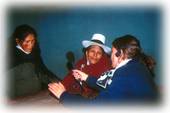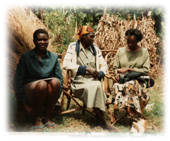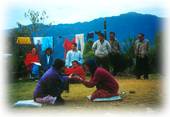overview
The interviews on this site have been gathered by the Oral Testimony Programme of the Panos Institute in partnership with local organisations. To date, over 300 interviews have been conducted by local people in local languages, recorded, transcribed, translated, and summarised. This project is part of Panos' Oral Testimony Programme, which aims to amplify the voices of those at the heart of development: people who are disadvantaged by poverty, gender, lack of education and other inequalities. Collecting and disseminating oral testimonies allows the least vocal and least powerful members of society to speak for themselves, rather than through outsiders or "experts". Collections have been gathered from communities in the Himalaya (India and Nepal); the Andes (Peru); the Sierra Norte (Mexico); Mount Elgon (Kenya); the highlands of Ethiopia and Lesotho; southwest and northeast China; the Sudety mountains (Poland); and the Karakorum mountains of Pakistan.
the use of local interviewersPanos' innovative Oral Testimony activities were developed in order to amplify the voices of the poor and the marginalised. It is acknowledged that much development activity has failed to meet the needs and aspirations of the most disadvantaged - yet these "experts" in the realities of inequality have had little opportunity to influence development policy and practice. Thus Panos works not with professional researchers, but trains local people in the methodology, so that interviewing is done in local languages, in relaxed settings, between people who share some, but not necessarily all aspects of the each other's backgrounds. The emphasis is on openness and willingness to learn and there is a basic assumption that the process of listening, as well as narrating, is of benefit. Becoming an interviewer has been for many participants as novel and valuable an experience as being a narrator. Often a conscious choice has been made to include people in the interview training whose access to education has been limited, and who would not normally have the chance to become involved in this kind of collaborative research or information gathering. At its best this approach produces extremely vivid material, and an excellent relationship between narrator and interviewer. However, not all interviewers prove ideally suited to the task, and you will experience the frustration of reading some interviews where good leads are ignored, or in which the interviewer focuses on his/her own interests and doesn't allow the narrator to develop their own story and perspective. However, when this "capacity-building" process works, there is a greater sense of ownership by those involved, and many partners have gone on to start new testimony projects, or expand upon the original activities. Testimonies are tape-recorded and transcribed by the interviewer. Partners work with local language tapes and transcripts; Panos with English versions, most of which are translated locally, sometimes by the interviewers. The emphasis is on word for word transcription and translation; questions are included. Each interview has been summarised, to give you some idea of the narrator, the content and key themes or concerns.
the value of oral testimonyOral testimonies are the result of free-ranging interviews around a series of topics, drawing on direct personal memory and experience. Good testimonies are full of human detail, individual experience and personal opinion. Interviewers do not use formal questionnaires, and narrators are encouraged to reflect upon the events they describe, and to give their views and opinions. The narratives which result are subjective, anecdotal, selective, partial and individual. But what some might call a "weakness" in the evidence is in fact a resource, for the way that people remember or describe something tells us what is important about it to them. Oral testimonies offer clues as to how people interpret events and - especially valuable in the context of development - what their priorities and values are. Ultimately, they tell us less about the fine detail of events and experience than about their meaning for people. And they highlight the complexity and variety of experience within any "community". Oral testimony collection does not replace more formal or quantitative research, but it complements and illuminates it. Such qualitative material cannot give a complete or fully "representative" account of a community's views or experience (unless a project was undertaken on a massive scale), but it is illustrative, vivid, often challenging, and breathes life into more precise statistics. Projects are based on the view that perceptions are just as important as facts in understanding development decisions and priorities. Oral testimony collection provides a way to gain understanding of those perceptions and their influence on people's thinking. Thus a good oral testimony records not just events and practices, but provides clues as to their meaning and significance for people. We hope readers of these interviews will gain insight, not just information. So do not explore this site if you want only to uncover facts,
figures and irrefutable truths; do embark on it if you want to gain
greater understanding of what people believe to be important and
"true", and why. news PUBLISHED IN 2003: The latest two booklets published in the Voices
from the Mountain series are a selection of interviews from Uttaranchal
and Himachal Pradesh, India; and Nepal. They are available from
the Oral Testimony Programme and are free to resource-poor non-governmental
organisations and other institutions in developing countries. Copies
are otherwise £5; bulk discounts are available. Please contact info@mountainvoices.org
if you would like to order the Nepal or India booklets, or any of
those booklets already published: Kenya; Lesotho; Ethiopia; Peru;
China; and Poland. more informationFor more information about the Panos Oral Testimony Programme please visit the Panos London website.
|



